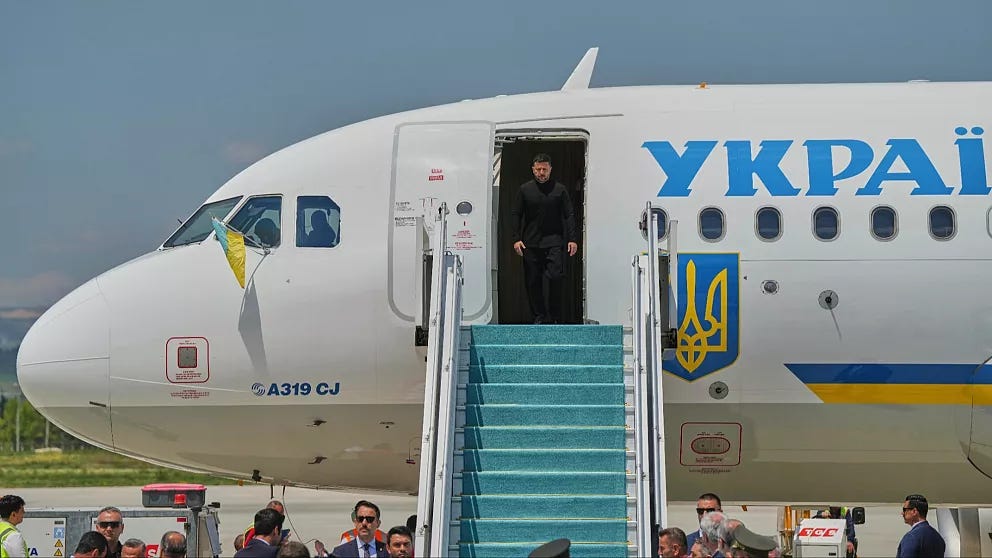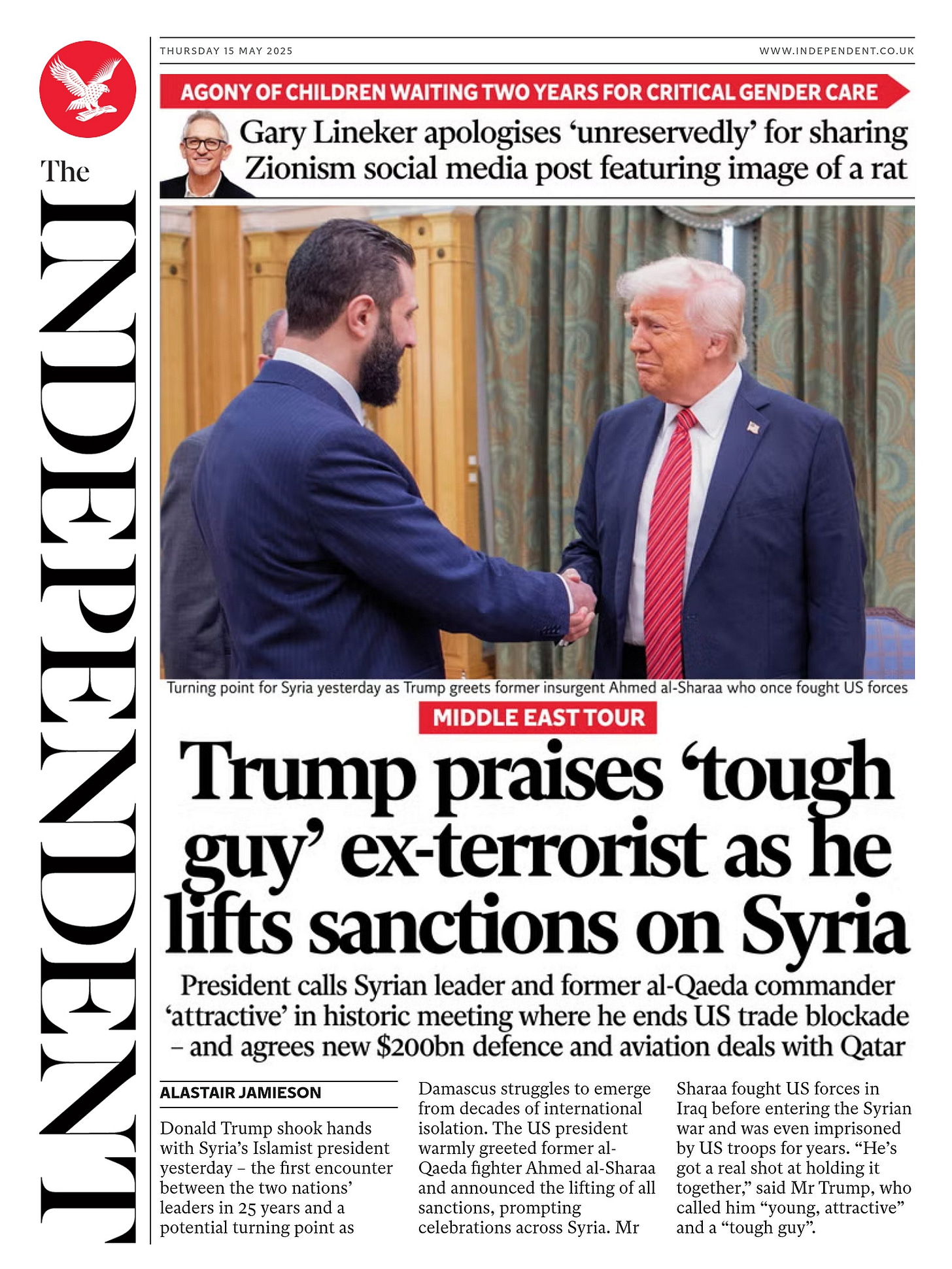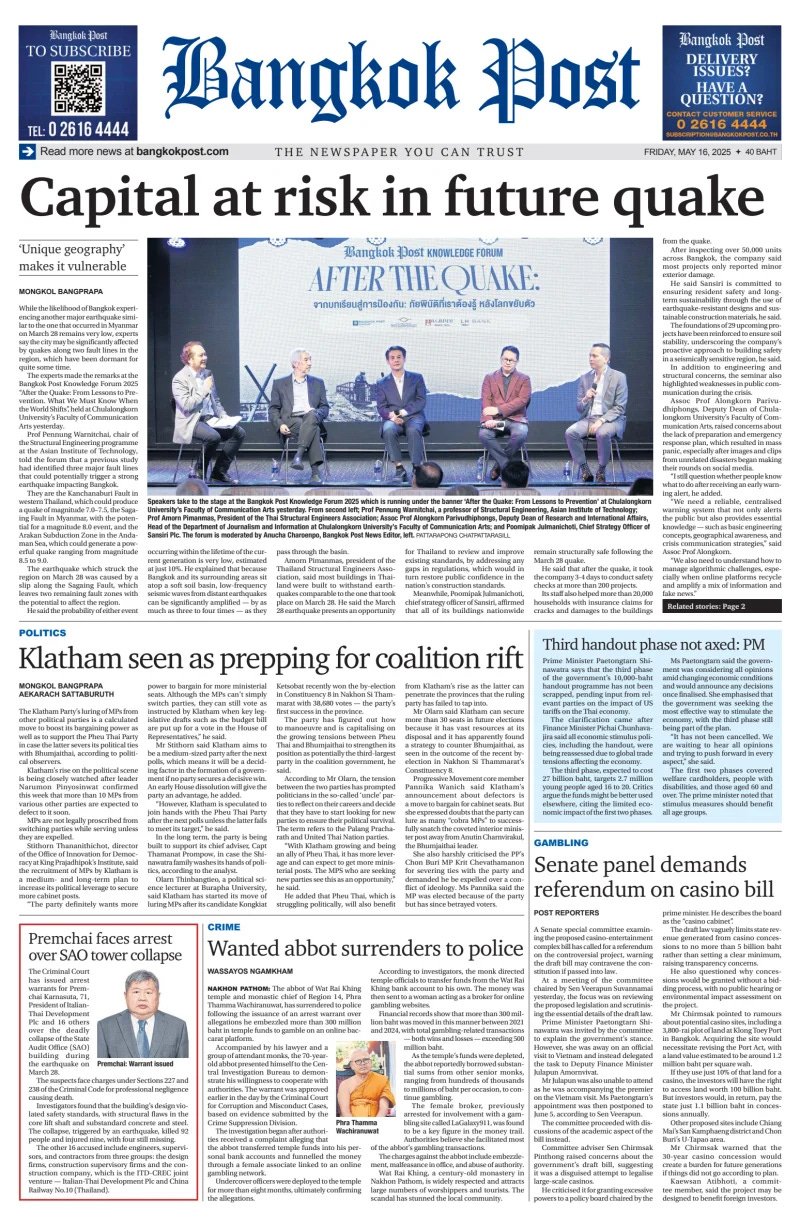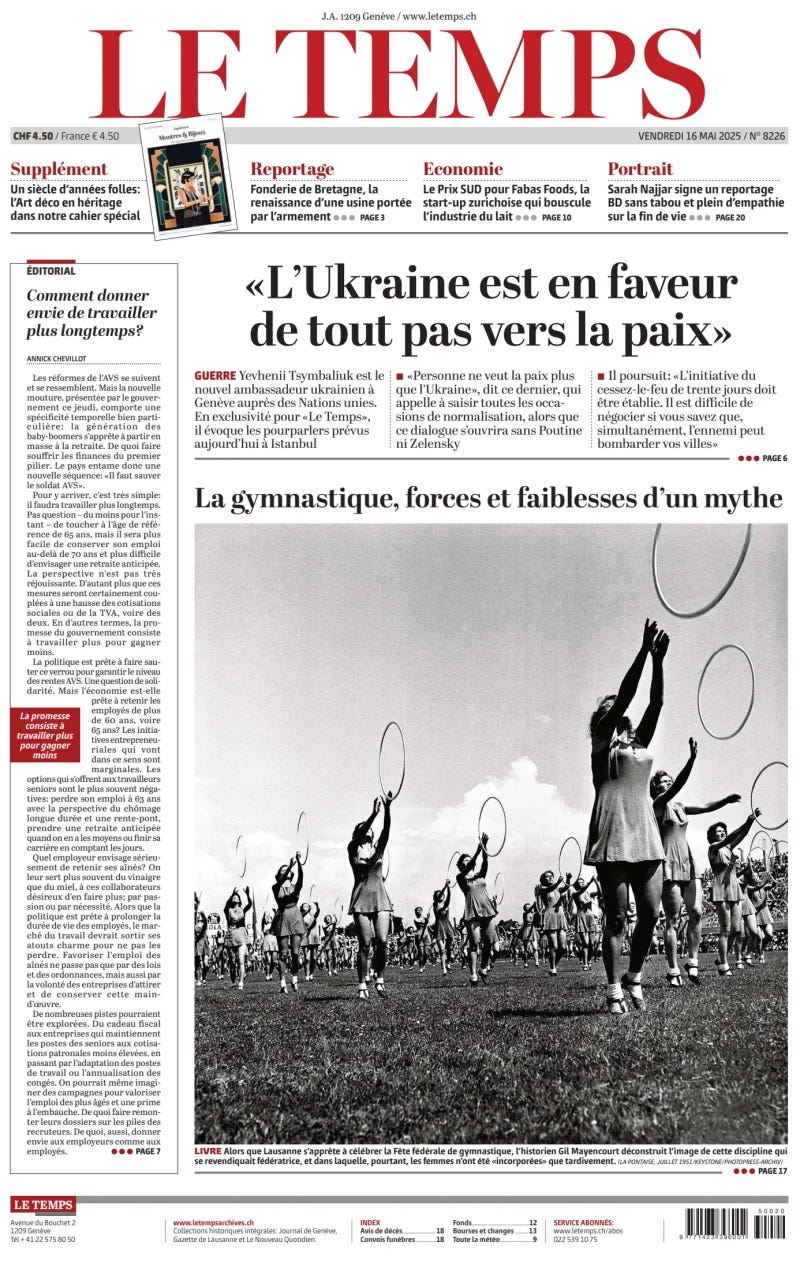Diplomatic Standoff: Russia and Ukraine Clash in Turkey as Peace Talks Stall
With first potential peace talks in three years near collapse, tensions flare between Kyiv & Moscow—while Donald Trump reenters the fray, vowing involvement after previously threatening to walk away
An anticipated round of Ukraine peace talks in Turkey descended into bluster and confusion on Thursday, as Ukrainian and Russian delegations arrived in different cities and spent much of the day questioning whether they would even meet with one another. By evening, both sides indicated that the talks in some form were still on, but that they could be postponed until Friday. President Volodymyr Zelensky of Ukraine, visiting the Turkish capital of Ankara, slammed the Kremlin for its “disrespect” in sending a midlevel delegation to Istanbul, where Russia wanted the talks to take place. “There is no time of the meeting, there is no agenda of the meeting, there is no high-level delegation,” Mr. Zelensky said at a news conference after sitting down with President Recep Tayyip Erdogan of Turkey. “I think Russia’s attitude is unserious.” After a day of uncertainty over whether Ukraine would participate in the talks in Istanbul, Mr. Zelensky said he would send a pared-down delegation there, led by the minister of defense, Rustem Umerov. He said he made the decision to show that Ukraine would engage in any effort for peace, even one with the slimmest chance of success, after President Vladimir V. Putin of Russia rebuffed his appeal to meet in person in Turkey. Overshadowing it all was President Trump, who told reporters traveling with him on Air Force One that “nothing’s going to happen until Putin and I get together.” Mr. Trump, who was in Qatar and the United Arab Emirates on Thursday, had earlier said that he might travel to Turkey on Friday “if something happened” in the peace talks. However, there was no other indication that a last-minute summit would materialize. Mr. Putin last weekend proposed direct talks between Russia and Ukraine, in what would be the first known face-to-face negotiation between the two sides since the first weeks of the war, in March 2022, shortly after Russia’s invasion. Mr. Zelensky upped the ante by calling on Mr. Putin himself to come, and arrived in Ankara on Thursday with his foreign minister and other senior officials. But Mr. Putin refused, and instead sent a delegation that was a mirror image of the one he dispatched for the 2022 talks, which fell apart after about two months and included a high-profile meeting in Istanbul. In that negotiation, Russia made numerous demands that would undermine Ukraine’s sovereignty, seeking a pledge that the country would never join NATO and would limit the size of its military. Vladimir Medinsky, a former culture minister who led Russia’s delegation in 2022 and resumed that role on Thursday, told reporters that Russia saw the new round of talks as “a continuation of the peace process” of that year - NYT
My hot take comment: There was always skepticism about the notion that Russian President Vladimir Putin—an autocrat famously resistant to ultimatums—would fly to Turkey to meet with his Ukrainian counterpart. That skepticism appears well-founded. After today’s diplomatic circus, it seems that only a low-level Russian delegation in Istanbul will meet with Ukraine’s defense minister on Friday. And now, re-entering stage left: U.S. President Donald Trump, who reminded American troops in Qatar (in case anyone forgot) that he won three elections, not two. Trump has declared that the only path to peace in Ukraine lies in a face-to-face meeting between himself and Putin. But wait—wasn’t this the same Trump who, just days ago, pledged his administration was ready to walk away from the talks entirely? After today’s display of tantrum diplomacy, one thing is certain: peace in Ukraine remains, sadly, as elusive as ever.
A British doctor has shared footage with the BBC from inside the European Gaza Hospital near the southern Gaza city of Khan Younis, moments after a deadly Israeli air strike. Dr Tom Potokar, a consultant plastic surgeon who has been to Gaza 16 times to treat patients, was at the hospital when warplanes dropped six bombs, killing 28 people and injuring dozens. Israel says it was a precise strike on Hamas. The hospital has since been evacuated Dr Potokar shared this footage of what he saw. He told the BBC it was a "snapshot" of what he had seen while working at the hospital. "We've been treating patients with huge open wounds, some even with maggots in, infected, multiple amputations, children down to the age of two with significant nerve injuries, traumatic brain injuries," he said. Israeli bombardment on Thursday killed at least 114 Palestinians in Gaza, rescuers and hospitals said.
Journalists in Gaza say they face intimidation, threats, and assaults by Hamas — abuses that often go unreported due to fear of retaliation. For almost two decades, the Committee to Protect Journalists (CPJ) has documented multiple press freedom violations by Hamas — as well as all the other warring parties in Israel and the Occupied Palestinian Territories — including detentions, assaults, obstruction, and raids. The war in Gaza has been the deadliest period for journalists since CPJ started keeping records in 1992, with at least 178 journalists among some 52,000 Palestinians killed since Hamas’ deadly October 7, 2023 attack on Israel. An overwhelming majority of these killings, arrests, and threats were carried out by Israeli forces. The Palestinian Journalists’ Syndicate (PJS) often documents Hamas attacks on the media internally, without publicizing them, for fear of reprisals, the group told CPJ. In other cases, PJS staff hear about events secondhand as journalists are too scared to report them. A correspondent for Fatah-affiliated Awda TV, Abu Aoun told CPJ that he was beaten by Hamas’ Internal Security Force in 2024 while interviewing a woman near Al-Aqsa Martyrs Hospital in central Gaza’s Deir al-Balah. “During the interview, the woman insulted Hamas and some of its leaders. The officers immediately took me to an unknown location and beat me,” said Abu Aoun, 26, adding that they searched his cell phone and told him to stop working in the vicinity of the hospital.
Latvia’s intelligence agency warned that individuals who appear to be lost tourists, may in fact actually be Russian saboteurs or spies. In its annual report, Latvia’s Defence Intelligence and Security Service (MIDD) determined that Russian intelligence and security services posed the "main threat" to its national security. MIDD shared advice on how to identify possible reconnaissance and sabotage operatives, listing a series of telltale signs — which include a slovenly appearance, mismatched military or sportswear, as well as a knack for asking locals suspicious questions. The security service added that individuals may also carry specialised medical kits, as well as maps or radios — which are more suited to a clandestine operation than a camping trip. It also warned that suspects may linger near military or critical infrastructure sites and pose as humanitarian workers, as well as stay in remote areas, without showing any interest in nature. According to MIDD, Russian saboteurs might also attempt to incite unrest or assassinate “socially significant individuals”, adding that they may focus their activities on “studying the position of the target country’s society and inciting unrest directed against the existing government.” The agency cautioned that appearances can deceive. “The Ukrainian experience shows that Russian special services are able to adapt,” the report says. Not all spies will fit the mold, and suspicions must be judged in context - Euronews
Pope Leo XIV met Thursday at the Vatican with the head of the Greek Catholic Church in Ukraine, in one of his first audiences as pontiff that reaffirmed his appeal for a peaceful, negotiated end to Russia’s war. His Beatitude Sviatoslav Shevchuk said he invited Leo to visit Ukraine and presented the pope with a list of prisoners held by Russia. The Vatican under Pope Francis had worked for prisoner exchanges, as well as for the return of Ukrainian children taken to live in Russian-occupied territories. The Vatican didn’t release any statement after the audience, one of the first private audiences held by Leo since his election May 8. In his first Sunday noon blessing as pope, and again during an audience with pilgrims from eastern rite churches this week, Leo has appealed for an end to the war and expressed solidarity with the Ukrainian people. The Vatican secretary of state, Cardinal Pietro Parolin, said it was “premature” to think of a possible papal visit to Kyiv, which Ukrainian President Volodymyr Zelenskyy had also suggested during a first phone call with Leo on Monday- AP
Beijing is more likely to carry out a blockade or economic warfare against Taiwan rather than an invasion, witnesses and lawmakers said at a congressional hearing on Thursday, even as they urged the US to prepare for all scenarios. “The most likely scenario is they’re going to try this cyber-enabled economic warfare campaign,” said Mark Montgomery, a retired US rear admiral and senior director at the Washington-based Foundation for Defense of Democracies, testifying before the House Select Committee on the Chinese Communist Party. “Beijing will want to force Taiwan’s capitulation through less drastic methods” than a military takeover, he added. As for what such a campaign would entail, Montgomery believed it would target Taiwan’s financial, energy and telecommunications sectors, and involve “malicious” cyber activity. Beijing sees Taiwan as part of China to be reunited by force if necessary. Most countries, including the US, do not recognise Taiwan as an independent state, but Washington is opposed to any attempt to take the self-governed island by force and is committed to arming it. And even if a mainland invasion was not likely, the US still needed to prepare for it, witnesses said. Beijing’s “goal would be to subjugate Taiwan without invading”, said Charles Flynn, a retired US army general, but “we cannot discount the threat that they pose by what they do with their air, maritime and ground forces” - SCMP
Thailand needs to urgently address the freefall in foreign arrivals,, by reforming the sector and creating new destinations, according to a former head of the Tourism Authority of Thailand (TAT). Yuthasak Supasorn said the greatest concern was the Chinese, Hong Kong and South Korean markets, which dropped 31%, 20.8% and 14.9%, respectively. Moreover, the Mice (meetings, incentives, conferences and exhibitions) segment also declined in the first quarter of 2025, with the international market plunging 15% and revenue dropping 21% year-on-year. "We must stop this freefall and halt the crisis in Thai tourism, bringing back tourists and using this opportunity to restructure to attract higher-quality visitors," said Mr Yuthasak. As safety has become a critical tourist concern, rebuilding the nation's image is insufficient to restore the market, as the hospitality sector needs to be elevated to regain travellers' trust, he said - Bangkok Post






